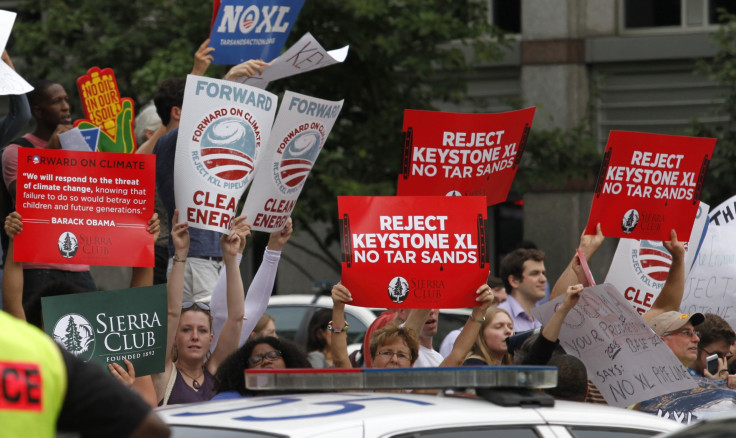Keystone Pipeline Update: Second Portion Of TransCanada's (TRP) Closer To Completion

Energy giant TransCanada Corp. (USA) (NYSE:TRP), the company that is building the Keystone XL pipeline, reported Monday that the second half of its pipeline is a step closer to completion after the company successfully injecting oil into a portion of the pipeline.
The $2.3 billion pipeline would bring more than 700,000 barrels of oil a day from the oil hub of Cushing, Okla., to Texas refineries. The project has been under construction since August 2012.
Until recent years, U.S. crude stored in Cushing was shipped north and east, but as more oil was produced in the Upper Midwest and in Canada, refineries in the eastern and northern U.S., as well as in Canada, have not been able to keep up with the glut.
Currently the Canadian company is seeking approval from the U.S. to start construction of the northern half of the Keystone XL project, which would bring tar sands oil from Alberta to U.S. Gulf Coast refineries. It is up to President Barack Obama to give the approval because the pipeline crosses the U.S. border. So far Obama has delegated the State Department to determine whether the project is in the U.S.'s "national interest."
Opponents say extracting crude oil from Alberta is extremely energy-intensive and will accelerate climate change, because it requires breaking down a semi-solid form of petroleum, called tar-sands, so it can flow through a pipeline, something that is not necessary for normal crude oil.
Proponents, on the other hand, say the benefits of the pipeline outweigh the environmental risks because it will reduce America's dependence on oil from hostile, unstable countries in the Middle East and elsewhere.
Environmentalists have been fighting the entire project, but one reason the Gulf Coast pipeline has gained less attention than the northern part is that it does not cross an international border. That does not mean environmentalists have not been fighting the project’s southern leg.
In October a U.S. Circuit Court of Appeals in Denver refused to temporarily stop construction of the Keystone Gulf Coast pipeline.
The Sierra Club, Clean Energy Future of Oklahoma and the East Texas Sub Regional Planning Commission had sued the U.S. Army Corps of Engineers, saying the pipeline would pose significant environmental risks. They wanted to put an injunction on Keystone XL's construction while the lawsuit was being heard, but a district court denied the request.
In a split decision, judges from the 10th U.S. Circuit Court of Appeals upheld the ruling, saying the plaintiffs were unable to prove that environmental harm would outweigh the economic risks of halting construction.
The appeals court said it was “undisputed that further delay [would] cost hundreds of thousands of dollars each day."
The environmental groups also could not post a bond to cover the energy giant’s losses if the company won the lawsuit.
“We are pleased that the Court of Appeals has agreed that the Sierra Club’s attempt to get an injunction to halt construction was 'woefully deficient' and that the harm to TransCanada [from granting a preliminary injunction] was significantly greater than the 'minimal impact on the environment,'” TransCanada spokesman Shawn Howard told the International Business Times.
“The net effects of the pipeline’s impact on our climate will be absolutely critical to determining whether this project is allowed to go forward," Obama has said.
The president faces mounting pressure to exploit the strategic and lucrative commodity while also pursuing his goal to reduce greenhouse gas emissions. But TransCanada is worried the approval may not be forthcoming.
© Copyright IBTimes 2024. All rights reserved.






















